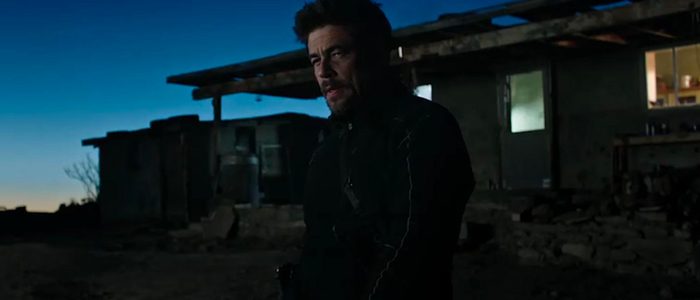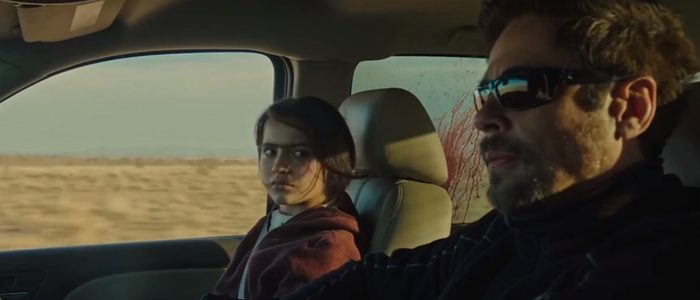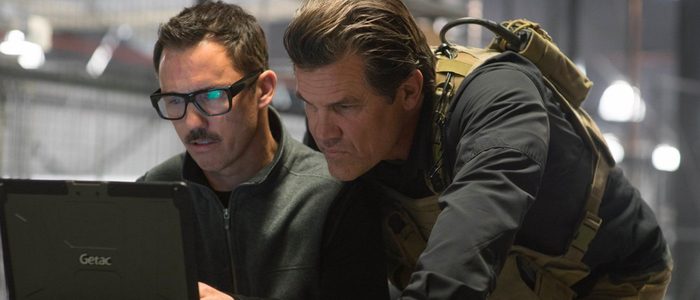'Sicario: Day Of The Soldado' Spoiler Review: A Sequel That Ignores What Made The First Film Work
(In our Spoiler Reviews, we take a deep dive into a new release and get to the heart of what makes it tick...and every story point is up for discussion. In this entry: Sicario: Day of the Soldado.)
Did you remember to send a card to your parents for The Day of the Soldado? Did you take advantage of Amazon's Day of the Soldado Cyber Monday Sale? I sure hope so, because Sicario: The Day of the Soldado has come and gone. And now we have to talk about it. For reasons beyond mortal comprehension, someone, somewhere, said, "What if we made a sequel to 2015's Sicario, but got rid of all the good stuff?"
Day of the Soldado
The 2015 thriller Sicario was a piece of entertainment that had some questionable material handled in a rich, complex, often thrilling way. Not everything in Taylor Sheridan's script worked, but what Sheridan's writing lacked, director Denis Villeneuve more than made up for. Villeneuve, working with master cinematographer Roger Deakins, was able to craft a frequently terrifying saga. The first few minutes of the first Sicario are a master class at building tension. Villeneuve and Deakins' visuals paint a stark, disturbing portrait, while Jóhann Jóhannsson's droning, pulsing score grabs hold of your heart. Soon after, star Emily Blunt enters, and we're drawn to this woman – a moral woman in the middle of an immoral world. All of this stuff really worked!
And it's all gone for Sicario: Day of the Soldado. This is the U.S. Marshals of the 21st century, folks. Let me explain for those who don't know: in 1993, the film The Fugitive hit theaters. It was phenomenal. The script was air-tight, the direction and pacing was exciting, and Harrison Ford made for a compelling lead. Also good in the film: Tommy Lee Jones, as the dedicated U.S. Marshal trying to capture Ford for a crime he didn't commit. After The Fugitive ended, there was no possible room for a sequel. Ford's character was cleared – what was he going to do, get framed for another crime for The Fugitive 2? Of course not! But Hollywood can never leave a good thing alone. So we ended up with a Fugitive sequel anyway. It was 1998's U.S. Marshals, and it wasn't very good. Ford was gone, but Jones was back, now elevated to lead. To this day, people still regard The Fugitive as a prime example of smart Hollywood filmmaking. No one talks about U.S. Marshals.
And yet here we are again. Day of the Soldado does away with Emily Blunt's compelling lead, and instead elevates Benicio del Toro's mysterious, deadly Alejandro to the lead. Del Toro was great in the first film, but what made his Alejandro so memorable was how unknown he was. We never really know what he was going to do, or what his deal was. In short, he worked better as a supporting character.
Before we get to Alejandro, though, Day of the Soldado decides to kick things off with a Trump-ian wet dream about the dangers of immigrants illegally crossing the border. In the world of Day of the Soldado, these aren't just migrant workers fleeing their home for a new life. No, it's much, much worse. As the film begins, we learn that Mexican drug cartels are now working with ISIS, smuggling some of their suicide bombers over the Mexican border. A series of suicide bombings in a public place sends the U.S. Government reeling.
The Secretary of Defense (Matthew Modine) wants swift, deadly action. His solution: destabilize the Mexican cartels by starting a war. There's a potentially interesting story here about U.S. government intervention, coups and warfare. But Day of the Soldado is only interested in this stuff on a surface level. What it really wants to do is give Benicio del Toro an excuse to shoot a bunch of people.
Croc-wearing CIA agent Matt Graver (Josh Brolin), whom we met in the first Sicario, is called in by the government to help start the cartel war. Having worked for the CIA, he has some experience in this situation, having done similar things in the middle east. Graver then decides the best man to help him with this job is del Toro's Alejandro. A plan is formed: kidnap Isabela Reyes (Isabela Moner), the daughter of a drug kingpin. Alejandro has a history with Isabela's father – the drug lord played a part in murdering Alejandro's whole family. The stage is set for some sort of revenge on Alejandro's part – to further the revenge he took at the end of the first Sicario. But that element vanishes from the plot pretty quickly.
What follows instead is a series of hyper-violent shoot-em-ups. I'll give Day of the Soladado this: some of these scenes are effective. And eventually, the film starts to turn into something interesting. And then it ends, with an utterly bizarre callback to The Godfather, leaving the viewer with an overall hollow feeling. Maybe Sicario 3 will be better. Or maybe we'll come away from that film wondering why someone thought this needed to be a franchise to begin with.
What Works
While Benicio del Toro's Alejandro works better in a supporting role, del Toro remains strong in the part. The actor has a cool, calculated approach to the part, with a good heart lurking underneath it all. Of course, this is slightly hard to swallow, because at the end of Sicario we saw Alejandro gun down an entire family – children and all. The Alejandro here is still just as violent – in the first half of the film, a montage unfolds where Alejandro racks up a body count without batting an eye. But Day of the Soldado returns some humanity to the character. Midway through the film, Alejandro encounters a deaf farmer somewhere in Mexico, and he's able to communicate with him through sign language. We learn that Alejandro knows how to sign because his now-dead daughter was deaf. It's a simple revelation, but there's something effective about this moment – a reminder that before Alejandro became a killing machine he had an entirely different life.
What restores part of Alejandro is the protective relationship he develops with kidnap victim Isabela Reyes. If Day of the Soldado has a true bright spot, it's actress Isabela Moner, who is something of a revelation here. We're introduced to Isabela in the middle of a school yard fight – a scene that immediately establishes the character as tough and assertive. But all her toughness is no match for the violent world she's suddenly stuck in the middle of when she's abducted by Matt Graver and his team (and Alejandro). Graver has an elaborate, overly complicated plan that involves bringing Isabela to America, then making her think she's been rescued by DEA agents so that she can eventually be brought back across the border.
But things don't go according to plan. And once back across the border, Graver and his team are caught in the middle of a shootout with Mexican police. This shootout is staged in a highly effective manner, with the sound design doing most of the heavy lifting. The theater felt like it was shaking as each loud bullet exploded from a cavalcade of weapons. Director Stefano Sollima does not possess the same skill Denis Villeneuve did for staging set pieces, but he is able to make the gunfire in Day of the Soldado seem utterly terrifying.
After this big shootout, Alejandro and Isabella remain on one side of the border while Graver and his men go back. And that's when things get sticky – Graver is eventually ordered to kill both Alejandro and Isabella – an order he doesn't want to carry out. Meanwhile, Alejandro and Isabella are trying to get across the border with the help of an operation smuggling migrants across for heavy cash. As the film starts, Graver tells us that years ago, the most profitable thing being smuggled across the border were drugs. Now, it's people. Mexican gangs are exploiting families with the promise of the American dream. A better film would have more to say about this, but Day of the Soldado isn't that film. It only uses this as a story element to move characters from point A to point B.
Before all this happens, Day of the Soldado settles into a quieter space, and takes on the appearance of a modern-day Western. This is wonderful, and the film badly needs much more of this. Long, quiet scenes of del Toro and Moner talking by flickering firelight, or shots of Alejandro stepping out through a doorway into a wide-open space, invoking the iconic "Doorway Shot" from The Searchers. These are the best moments of the film, but Taylor Sheridan's script breezes past it all.
The operation to get Isabella across the border backfires badly, and Alejandro is executed before our eyes. It's a startling moment, and probably the best scene in the entire film. A tense, horrifying scene plays out as Isabella and Alejandro are roughly bound and gagged with duct tape, dragged to an isolated location, where Isabella is forced to watch a young gang member put a bullet in Alejandro's face.
And yet...Alejandro lives. It's a revelation that's both stunning and also kind of silly. For a brief moment, Day of the Soldado strays into Revenant territory, with the badly injured Alejandro dragging his bloody, injured body through the dirt to enact some sort of revenge. As this began, I suddenly perked up. At last, the film was starting to get interesting.
What Doesn't Work
Just as Alejandro has been softened up a bit for the sequel, so, too, has Matt Graver. But Graver's character change doesn't really work. With Alejandro, we can sort of buy his change of heart because we watch him spending time with Isabella. Graver, however, doesn't have scenes like this. The Graver we met in Sicario was a complete a**hole – a walking, talking tactical vest. The type of guy who probably had Truck Nuts hanging off the tailgate of his pick-up. He was detestable while also being somewhat charming, in the way that Josh Brolin excels at.
The Graver here is much harder to pin down. For the bulk of the film, he seems like a genuinely bad guy. That's fine! It's okay to commit to making Graver bad. But Sheridan's script apparently wasn't willing to let this stand. Perhaps someone, somewhere, gave Sheridan a note suggesting that he soften up Grave ever-so-slightly. As a result, the film's ending has Graver make a 180-degree turn, deciding not to kill Isabella and instead rescue her and suggest putting her in the witness protection.
To be clear: I'm not saying I wanted the film to end with Graver saying "Fuck it!" and gunning down a 16-year-old-girl. But had that happened, it would at least be in character. The Graver who suddenly decides to do the right thing here is not the guy we've spent the last one-and-a-half movies with. This isn't Brolin's fault – he's very good here, employing a certain cockiness that's easy to enjoy. But the script betrays him, and the film suffers for it.
Speaking of that script: what the hell is going on here? Sheridan has made a name for himself with some memorable scripts, but Day of the Soldado feels like it was written by someone trying to ape Sheridan's style. Sheridan pens stories about bad men doing bad things against a bad landscape, and that's exactly what's going on here. But it's all too much. There are about four different films crammed together in here, and it gets messy. On one hand, there's the story about ISIS working with the Mexican cartels to attack America. On an other, there's the subplot about Mexican migrants just trying to get across the border. And then there's the Alejandro/Isabella story. And then there's the story about Graver and the U.S. government bending and breaking the law, consequences be damned. The cherry on top of this is an origin story for Alejandro's rise to power. In theory, all of these story lines could be interesting. But Sheridan slaps them together with no grace, and the movie plays out as a collection of vignettes rather than a concrete narrative.
It is, perhaps, unfair to compare any cinematographer to Roger Deakins. Deakins is master of painting light and shadow with a camera lens. His work on the first Sicario is stunning to the extreme – one shot featured DEA agents descending into a blackened landscape at dusk, as if they were disappearing into the earth one by one. Deakins did not return for Day of the Soldado. Instead, Dariusz Wolski has taken over as cinematographer, and his work leaves a lot to be desired. This is an ugly film, and I don't just mean in content. Everything here looks flat and uninspired. The landscape is just there, lifeless, unused. The only memorable shot in the entire movie is the previously mentioned doorway moment, and that doesn't really count since it's just being lifted directly from The Searchers.
The same thing goes for the music. Jóhann Jóhannsson (who died earlier this year) composed an eerie, droning, dread-inducing score for the first Sicario. Jóhannsson used a lot of percussion in his score, creating what he called "subtle war music." Hildur Guðnadóttir's Day of the Soldado score, in comparison, is forgettable to the extreme. It's moody and low-key, and never stands out the way Jóhannsson's did. In the last few minutes of Day of the Soldado, one of Jóhannsson's themes from the first film is suddenly played, and it's like having cold water splashed on your face. You suddenly remember how fantastic his propulsive score was, and it makes you realize how utterly boring the score for this film has been the entire time.
I've read some complaints about Emily Blunt's character in the first Sicario. Some felt she was too naive; too clueless; too trusting. But that was the point of the character – Blunt's Kate Mercer was someone who believed in what she was doing, and thought that if everyone would just play by the rules, things would work out. By the end of the film, she realized that wasn't true at all, and her journey and descent was the key ingredient that made Sicario so memorable. By taking Blunt out of the equation completely for this film, Day of the Soldado loses a vital element.
By the time Day of the Soldado ends, don't be surprised if you find yourself feeling a little cheated. The prospect of Alejandro more or less rising from the grave makes the film suddenly spring to life. But before we can settle into this new narrative twist, Day of the Soldado jumps forward in time a full year, to tack on a coda that doesn't really make much sense and is so open-ended I was expecting "THE END...OR IS IT?" to suddenly appear on the screen when the scene cut to black. Alejandro is alive and well now, and presumably running his own empire. I suppose this is all a set-up for part three. But maybe we could've skipped all the dull stuff going on in this film and gotten to that instead?



